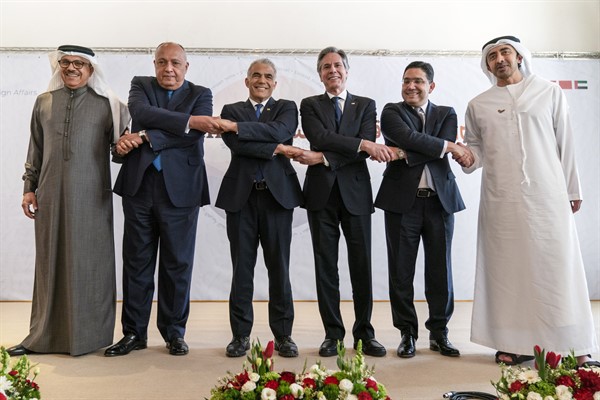Today at WPR, we’re covering the global trend of “frozen conflicts” going hot and why regional organizations in Africa have struggled to respond to coups.
But first, here’s our take on today’s top story.
Nearly a week after Hamas launched its cross-border attack on Israel, the war in Gaza, understandably, continues to dominate the headlines and conversation.
Now, with Israel demanding that more than 1 million civilians in northern Gaza evacuate to the southern part of the Hamas-held territory ahead of a widely expected Israeli ground invasion, the war seems unlikely to deescalate anytime soon.
In Daily Reviews this week, we’ve taken a look at the regional implications of the conflict and the global response to it. Today, we’re taking a look at the global implications of the Israel-Hamas war.
Get the Daily Review sent straight to your inbox every weekday.
As we noted earlier this week, for the signatory governments of the Abraham Accords, the war has highlighted the danger of getting too far out of sync with domestic popular sentiment, which remains committed to the Palestinian cause.
For the U.S., however, it has served as a damning indictment of the Biden administration’s short-sighted Middle East policy, which has focused on a potential deal normalizing relations between Israel and Saudi Arabia, while entirely neglecting the Palestinian file.
But the war is also bringing into sharp relief the challenges facing other outside powers as they attempt to expand their influence in a region long dominated by the United States. The pressure that China now faces, for instance, to take a stand on the conflict has exposed the vulnerabilities inherent to its strategy of seeking to straddle all sides of the region’s various fault lines. The same is true of Russia. The war’s polarizing effect, which is likely to increase as it continues and grows in intensity, makes that approach a lot more difficult to maintain for both Beijing and Moscow.
On a global level, the war in Gaza will also have concrete impacts, beginning with diverting attention away from other priorities and crises. Already, Ukrainian President Volodymyr Zelenskyy made a surprise visit to NATO headquarters earlier this week, urging the alliance to maintain its flow of military aid to Ukraine even as member states—most importantly, the U.S.—turn their focus to the war in Gaza.
Much like the war in Ukraine, too, the Israel-Hamas war has exposed double standards regarding international attention to conflicts. The crisis in Nagorno-Karabakh just a few weeks ago, for instance, received only fleeting attention. The ongoing war and humanitarian crisis in Sudan, nearly six months in, has received almost none.
And perhaps most importantly—as Paul Poast explains in his column today—the global order was already experiencing numerous crises and structural shifts. Throw in even more volatility and uncertainty to the mix, as the Israel-Hamas war is sure to do, and those crises could cascade unpredictably.

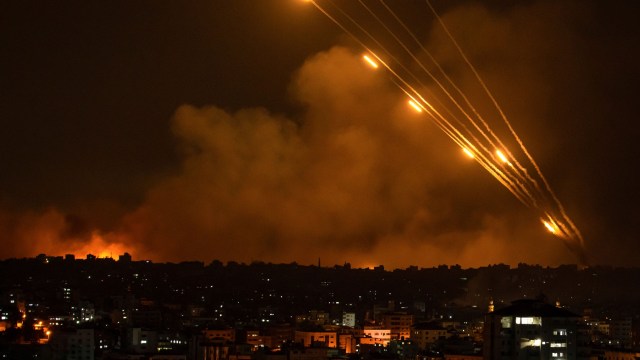
When So Many ‘Frozen Conflicts’ Go Hot, It’s Not Just Coincidence
Last week, one day before Hamas launched its attack on Israel, columnist Paul Poast wrote that numerous recent crises point to a fraying global security order as a result of the war in Ukraine. Now that Israelis and Palestinians are at war once again, he examines if this conflict fits that pattern.
“The fog of war is thick, especially when it comes to war onset,” he writes. “But when a series of wars and crises take place at or near the same time, it is implausible, though not impossible, to chalk it up to coincidence.”
Coups Are Exposing the Shortcomings of Africa’s Regional Organizations
After coups in Niger and Gabon earlier this year, regional organizations like ECOWAS, ECCAS and the African Union tried to alter events on the ground. So far, though, their responses have had little effect. The military remains in power in both Niamey and Libreville, and these organizations have appeared powerless to do anything about it.
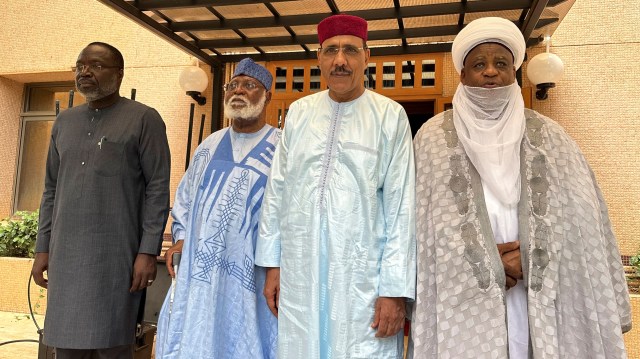
As Afolabi Adekaiyaoja writes, the scenario has become a familiar one with each successive coup across the region in the past three years, which raises the question: What explains African regional organizations’ inability to roll back these military takeovers?

Last week, the United Nations Security Council authorized a multinational armed mission to Haiti.
This week, we asked: Can this mission turn around Haiti’s security crisis?
The results? 74% of respondents said “No.”

The Allied Democratic Forces, a rebel group based in eastern Democratic Republic of Congo, killed at least one man and injured another in an ambush in western Uganda overnight. The ambush follows a massacre by the ADF in June at a school in Uganda, the deadliest attack the country had suffered in years.
The ADF, an Islamist militant group, formed in Uganda in 1995 but has largely operated in eastern Congo since 2001, making ADF attacks in Uganda a relative rarity. As Sophie Neiman wrote in June, though, rare as they may be, attacks like these still have the capacity to alter regional politics.
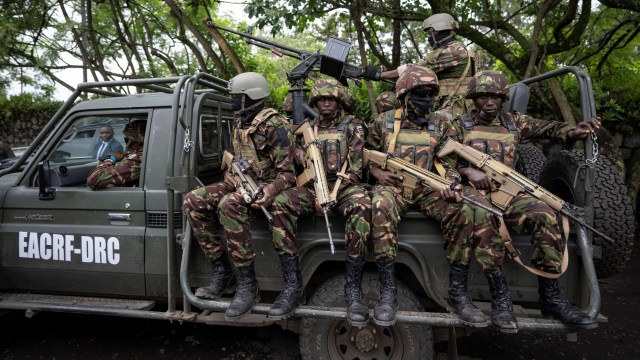
An ADF Attack Adds to Eastern Congo’s Already Complex Conflict
Jan. 20, 2023 | An ADF bomb attack that killed at least 17 people at a church is the latest high-profile incident in the security crisis in eastern Congo. Read more.
On Thursday, dozens of relatives of prisoners jailed in El Salvador called on the country’s Supreme Court to declare that upcoming “mass trials” of alleged gang members are unconstitutional. President Nayib Bukele’s ruling party approved special emergency provisions in July that allow people to be tried in a group if they have established links to various gang structures.
The provision is part of Bukele’s “war on gangs,” which has been accompanied by the suspension of a wide range of civil rights and has resulted in the arrests of 72,000 people so far for being alleged gang members or affiliates.
As Celia Medrano wrote last year, the “war on gangs” and the arbitrary detentions that have accompanied it have become reminiscent of El Salvador’s violent civil war from 1980 to 1992, when the Salvadoran state and its military acted with similar impunity.
Bukele’s ‘War on Gangs’ Is Reopening El Salvador’s Civil War Wounds
Dec. 13, 2022 | A state of emergency in response to increased gang violence has led to a spike in human rights violations across El Salvador. Read more.
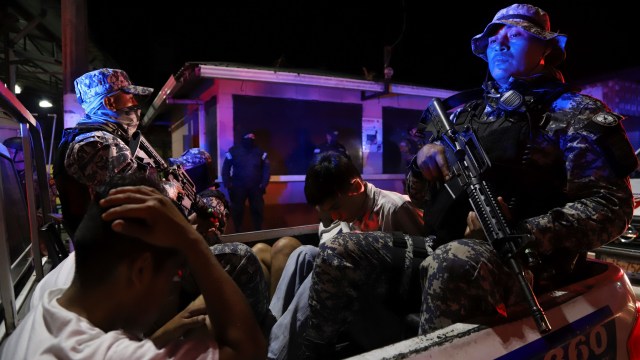
Upcoming Elections
- New Zealand heads to the polls for a general election tomorrow. Read Geoffrey Miller’s election preview here.
- Poland votes Sunday in legislative elections. Read Annabelle Chapman’s election preview here.
- Ecuador holds the second round of its presidential election Sunday in a campaign dominated by a surge in crime and violence, which Will Freeman examined in June.
More From WPR
- Paul Poast on “frozen conflicts” going hot.
- Afolabi Adekaiyaoja on coups in Africa.
- Alexander Clarkson on the Israel-Hamas war and Egypt.
- Amanda Coakley on domestic politics in wartime Ukraine.

